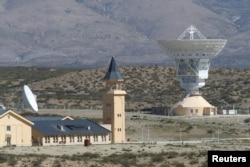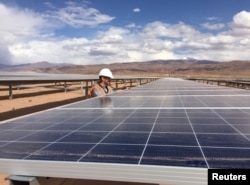For generations, the economies of Latin America and the Caribbean have been dominated by trade with the United States. In recent years, though, a growing push by China to invest in the region, lately accelerated by the Xi Jinping administration's Belt and Road Initiative, has begun to reorient trade toward China with far-reaching consequences.
On the sidelines of a seminar sponsored by Georgetown University's Center for Latin American Studies last weekend, experts in the fields of economics, national security and diplomacy discussed their growing concern with China's increased economic and political influence in the region and their frustration that the U.S. government is doing little to counterbalance it.
"China is here to stay in the Western Hemisphere," said Eric Farnsworth, vice president of the Americas Society and Council of the Americas. "It's probably been the most dramatic shift in regional affairs that we've seen this century."
Twenty years ago, according to World Bank data, nearly 57% of exports from Latin America were sold to the United States, and 49% of goods imported to the region came from the U.S.
At that time, trade with China in either direction was mired in the low single digits. By 2017, according to the same data set, the U.S. share of that market's imports and exports had declined significantly, and China had established itself as a strong No. 2 in trade inflows and outflows, accounting for 10% of exports and 18% of imports, with both numbers on the rise.
Part of China's heavy investment in infrastructure in Latin America is driven by economic self-interest, Farnsworth said, aimed at creating new business opportunities that will help extend its economic growth.
"But there is another element, as well, and this is that clearly as China continues to mature in terms of its own political ambitions and its own economic interests globally, it's beginning to seek ways to shape the opinions of other countries and leaders around the world to try to come alongside and support what China is trying to do, or perhaps at least remain neutral in the context of China's efforts to promote a certain worldview certainly supportive of and consistent with China's own ambitions."
Trade partners, political allies
It's this latter goal — and China's methods of furthering it — that has many experts worried about a U.S. response.
There are multiple examples of China extending credit to countries that are unable to service the resulting debt, creating opportunity for Beijing to take ownership of facilities that it was supposedly building for the benefit of the host country. In other cases, debtor countries simply find themselves weakened in future negotiations with Beijing because of their unsustainable debts.
Chinese authorities have long rejected such criticism, insisting the loans they are offering are fair. However, on the same day as the Georgetown seminar, the Chinese government announced during a development summit that Beijing is taking steps to make the loans it grants to smaller countries more "sustainable," and to root out corruption and inefficiency in procurement for infrastructure projects it funds abroad.
There is disagreement over whether these so-called "debt traps" are an intentional strategy of the Chinese, or simply the result of inexperience in measuring and pricing loan risk. But some, like John Feeley, former U.S. ambassador to Panama, have little doubt that China is using its economic might to take advantage of smaller countries.
"My initial sense was, especially when I was working as an American ambassador, that the debt trap was very much a conscious ploy by the Chinese government," Feeley said.
The aim, he believes, was "to lure countries where they wanted to have either that commercial access, or they had an ulterior motive for strategic positioning or turf, literally, on land to build ports for the Chinese navy or things like that."
Additionally, he said, "You have the undeniable, repeated use [by] China of its commercially privileged access to certain markets — in the Caribbean or in Central America — that are small, asymmetrically miniscule compared to China. And we see that they've used them undeniably for diplomatic and political advantage."
This includes, for example, persuading some governments to alter their relationships with Taiwan, an independent nation that China claims as its own territory.
Regardless of whether Chinese intentions are economic, political, or some combination of the two, the fact remains that Beijing's influence in Latin America is accelerating, and according to Feeley, the U.S. isn't even trying to counter it.
"The U.S. isn't really doing much," he said. "The last big trade mission with either White House or cabinet-level participation from the United States to Latin America was back in the first Obama administration. This is not a criticism of the Trump administration, but also of the second half of the Obama eight-year period. You don't beat something with nothing."
Ideally, he said, the U.S. should be actively engaging in the emerging markets of Latin America, promoting public-private partnerships, and promoting U.S. technology, companies and services.
"The way you do that is by getting them out there, and with the bully pulpit," he said. "But the fact is, we're not very good at that ... and when there's a void, China is very opportunistic."
Chinese government influence
Much of the investment being made in Latin America is coming from state-owned enterprises (SOEs) that operate under the ultimate direction of the Chinese Communist Party, meaning that even when money is not coming directly from the Chinese government, it remains closely tied to it.
And with Chinese government money comes Chinese government influence on things like norms surrounding transparency, human rights, trade practices and more.
"For a number of years, the U.S. was confused about how to properly respond, given that we have fundamental values about freedom of discourse and freedom of markets and things like that," said Dr. Evan Ellis, a research professor of Latin American Studies at the United States Army War College.
He said that years of a policy that amounted to "watch and express concern" have to yield to more active engagement in the region.
The object is not to keep China out of Latin America, Ellis said. "That would never work, and it would just annoy most of our partners in the region."
What's necessary, he said, "is to emphasize things like effective planning, rule of law, transparency in public procurement and good follow-up, so that while countries in the region and the U.S. are reaping the benefits of doing business with China, some of the more predatory and nefarious behaviors that come from that can be avoided."
Global threat?
While the focus of the seminar at Georgetown was on Latin America, participants made it clear that many of the same concerns apply to China's behavior on a global basis.
"We, the United States, the European community, western democracies, more or less since the end of the Second World War, for better or worse, we wrote the rules of the international order," Feeley said.
While not perfect, he said, that order, based on the premise that liberal democracy is the basis for peace and economic prosperity, has allowed for the creation of large amounts of wealth, advances in science and technology. It has also been marked by the absence of direct military conflict between great powers.
Allowing China, with its very different take on politics and human rights, to begin rewriting those rules in some parts of the world, he warned, is a serious danger.
"Do we, as Americans and Europeans, believe that authoritarian governments, suppression of dissent, a lack of democratic opportunity and liberty should be at the core of how the world does business and globalizes?" Feeley asked. "For those reasons, I do see it as one of the — if not existential — certainly one of the most challenging threats we face."












